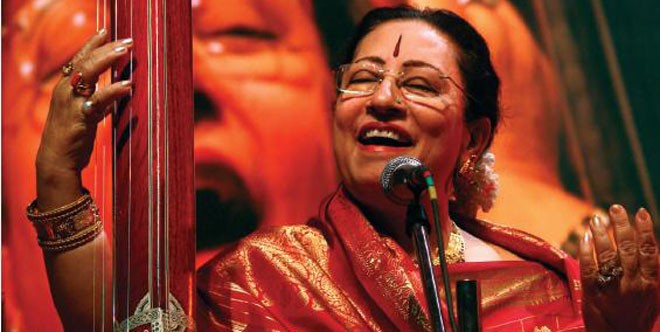

Parveen Sultana was awarded the Padma Bhushan on the Indian Republic Day, the January 26, this year. And many believe that this is an award richly deserved.
This is not the first time that she has been given an award. As far back as 1976 when she was barely in her mid-20s, she was decorated with the Padma Shri, incidentally the youngest performing artiste to get this award and about a decade later by the Sangeet Natak Academy Award -- all honours that testify to her talent as one of the most outstanding vocalist of classical music in the subcontinent. But these have not been all the awards bestowed upon her. In 1970 she got the award of Cleopatra of Music, in 1972 she was titled as Poetess of Music, Gandhrva Kalanidhi in 1980, Mian Tansen award in 1986, followed by Sangeet Samragni award in 1994 by the Assam Government.
Republic Day was also an occasion when outstanding performers used to visitPakistan from India to perform at the Indian High Commission in Islamabad and that also extended an occasion for other concerts to be organised in Lahore and Karachi. On such visits one has had the privilege to listen to Ustad Bismillah Khan, Pandit Jasraj, Ustad Sabri Khan, Pandit Hariprasad Chaurasia, Ustad Ghulam Mustafa Khan, and many others, all top of the line performers.
Apparently, no truly exceptional musician or vocalist visited this year; instead the good news of Parveen Sultana having been given one of the top awards of India was considered compensation enough.
She has many followers here in Pakistan. The initiated audience who retain the taste and flair for classical music have always placed her very high on their rating list. To many, she has been the leading female vocalist in the genre in her generation if Kishori Amonkar is considered belonging to an earlier generation.
Many have wished that she visit Pakistan and give a demonstration of her immense talent and systematic riaz. But this has only remained a wish so far as it did in the case of Ustad Vilayat Khan and Pandit Ravi Shankar. She has also been versatile and has sung in genres like khayal, thumri, bhajan and has also rendered her voice for a few films.
Her father Ikramul Majid and her grand father Mohammed Najeef Khan were well known musicians. Mohammed Najeef Khan was a talented rabab player and her father Ikramul Majid was a popular musician and a radio artiste who had his training under Gul Mohammed Khan of Karachi and later under Ustad Bade Ghulam Ali Khan.
The echo of rabab did play an important role in Parveen’s voice training giving it that rare sweetness. She was born in Assam but in that era the world of music was totally dominated by Bade Ghulam Ali Khan. All aspiring musicians wanted to be close to him, emulate his intonation and, if lucky become his formal pupils. Since Parveen Sultana’s father was a shagird of Bare Ghulam Ali Khan, she is generally recognised as the upholder of the tradition best exemplified by the Patiala Gharana.
In this eclectic age, the insularity of the classical tradition is difficult to comprehend. Even when the musician of one gharana or a tradition became the formal shagird of another, it always raised eyebrows, considered as a betrayal or compromise and heated debate ensued on the reasons for dong so. Its rights and wrongs were questioned over a period of time. So when the elders of Bare Ghulam Ali Khan belonging to Kasur became the shagirds of the Patiala Gharana, there was much resentment and the Kasur musicians felt slighted.
These loyalties can get more sensitive when the daughter of one family is married into another, both alike in dignity, the daughter’s family is seen to be making a concession. When the Nangli Amritsar Mian Payare Khan’s daughter married the Patiala Gharana’s Ustad Akhtar Hussain it was assumed that it amounted to accepting their superiority in music.
Parveen Sultana married Dilshad Khan and the couple sang and recorded together for decades but many feel that this marital association and submission to the societal man and wife propriety did not help her music. Actually it suffered on that count and probably it pulled her down. The numbers that they sang together were more out of loyalty than musical necessity. There was never a doubt who was more talented and on the cusp of greatness.
Parveen Sultana is particularly liked by those connoisseurs who find vigour and strength in the classical tradition, as a value that needs to be treasured. She renders the raag with full throated ease and lays great stress on improvisation. Her singing had the attributes of ‘maidaan ka gana’ where the mellifluous voice is not considered a sufficient virtue but a forceful display of virtuosity. In the subcontinent her mentor must have been Roshan Ara Begum in her prime as she represented these qualities and was admired for them.